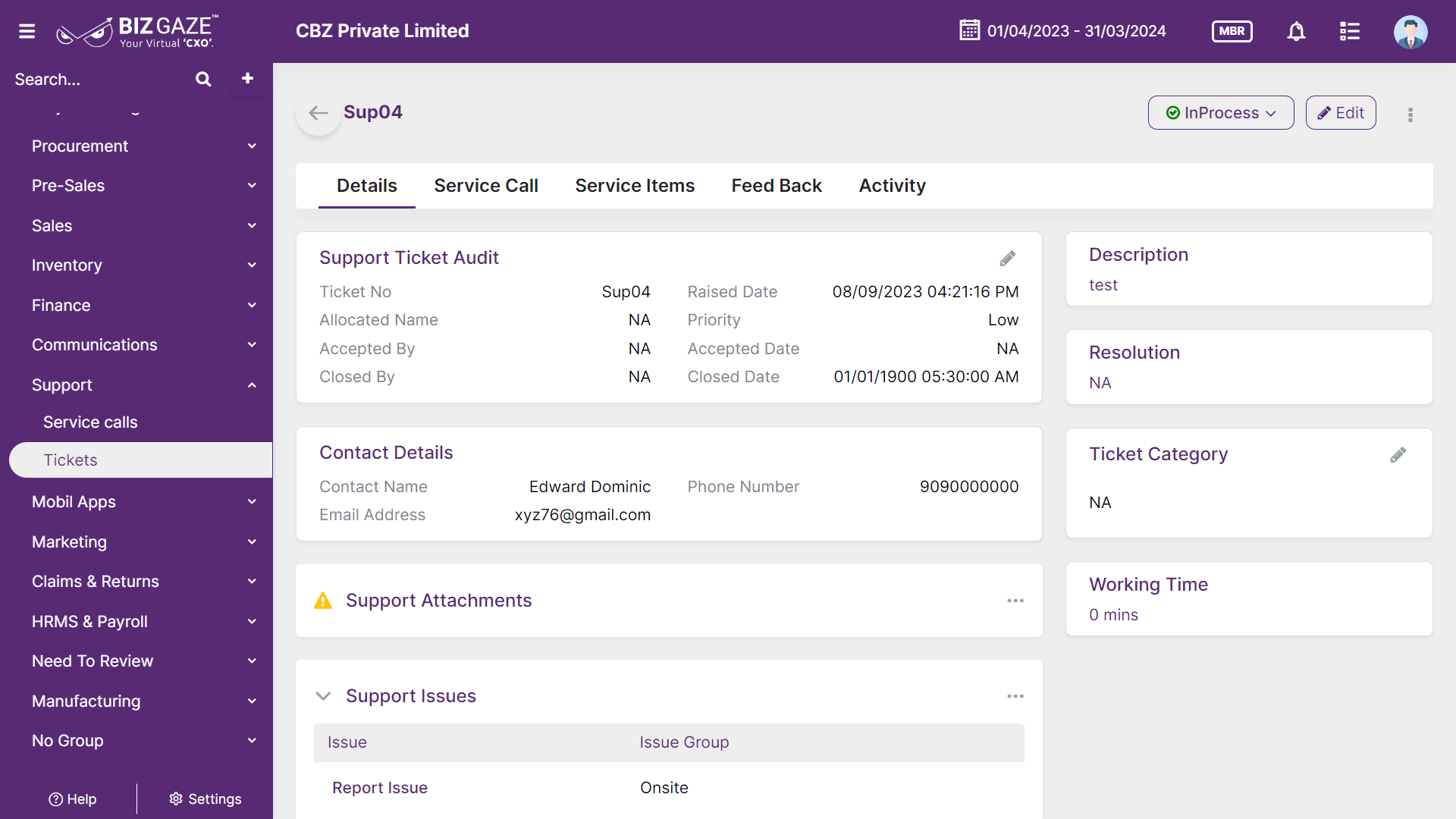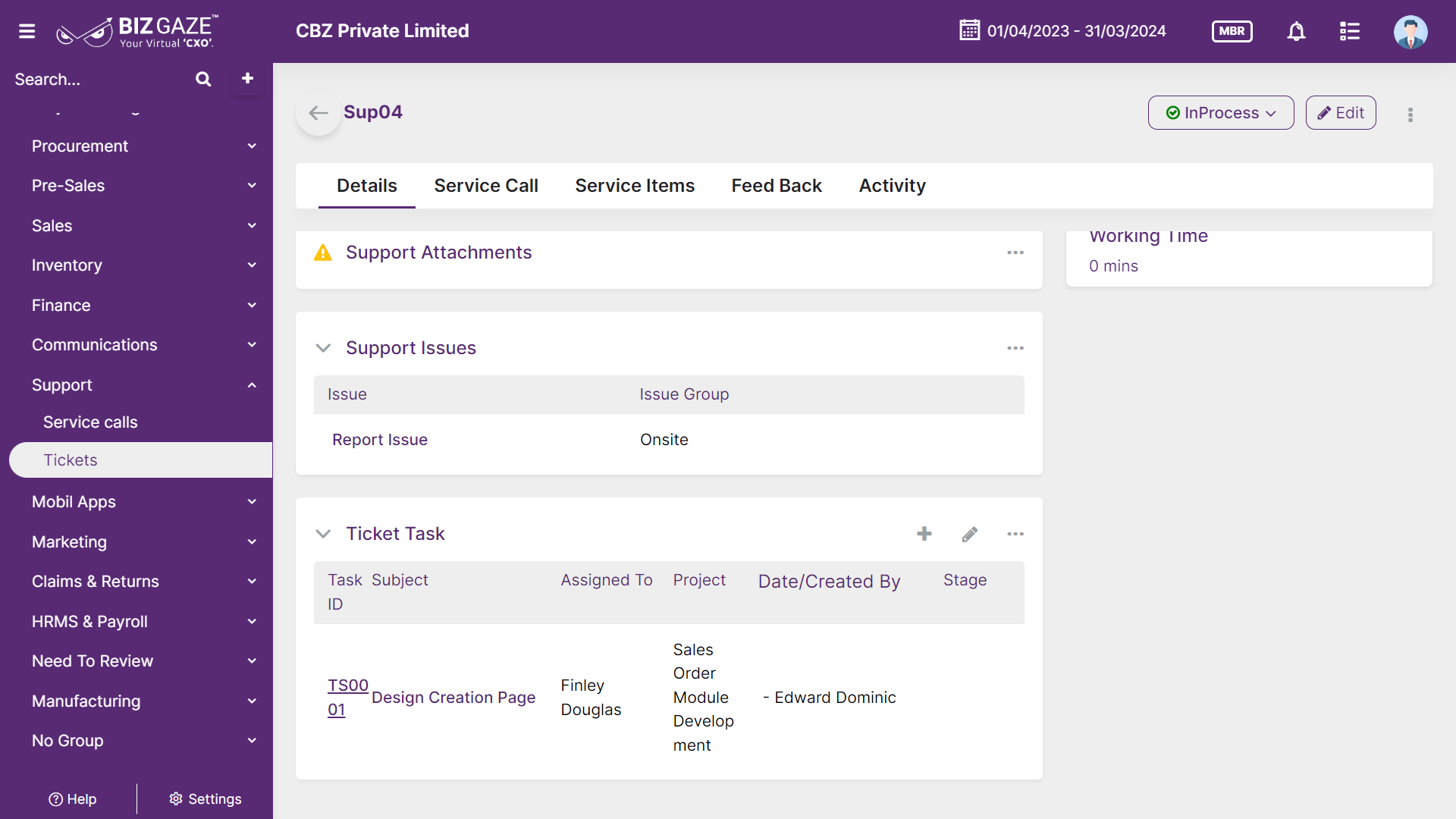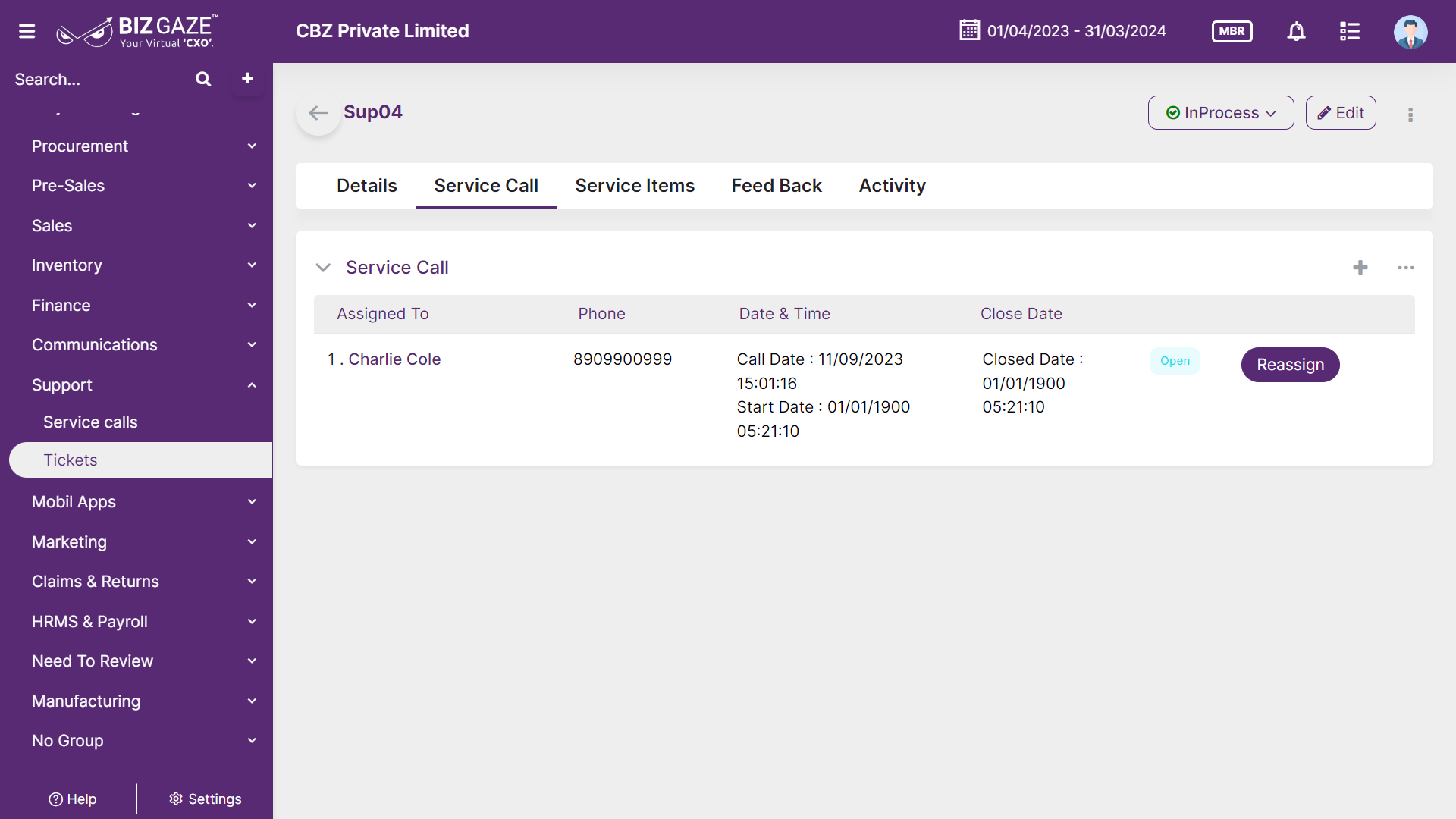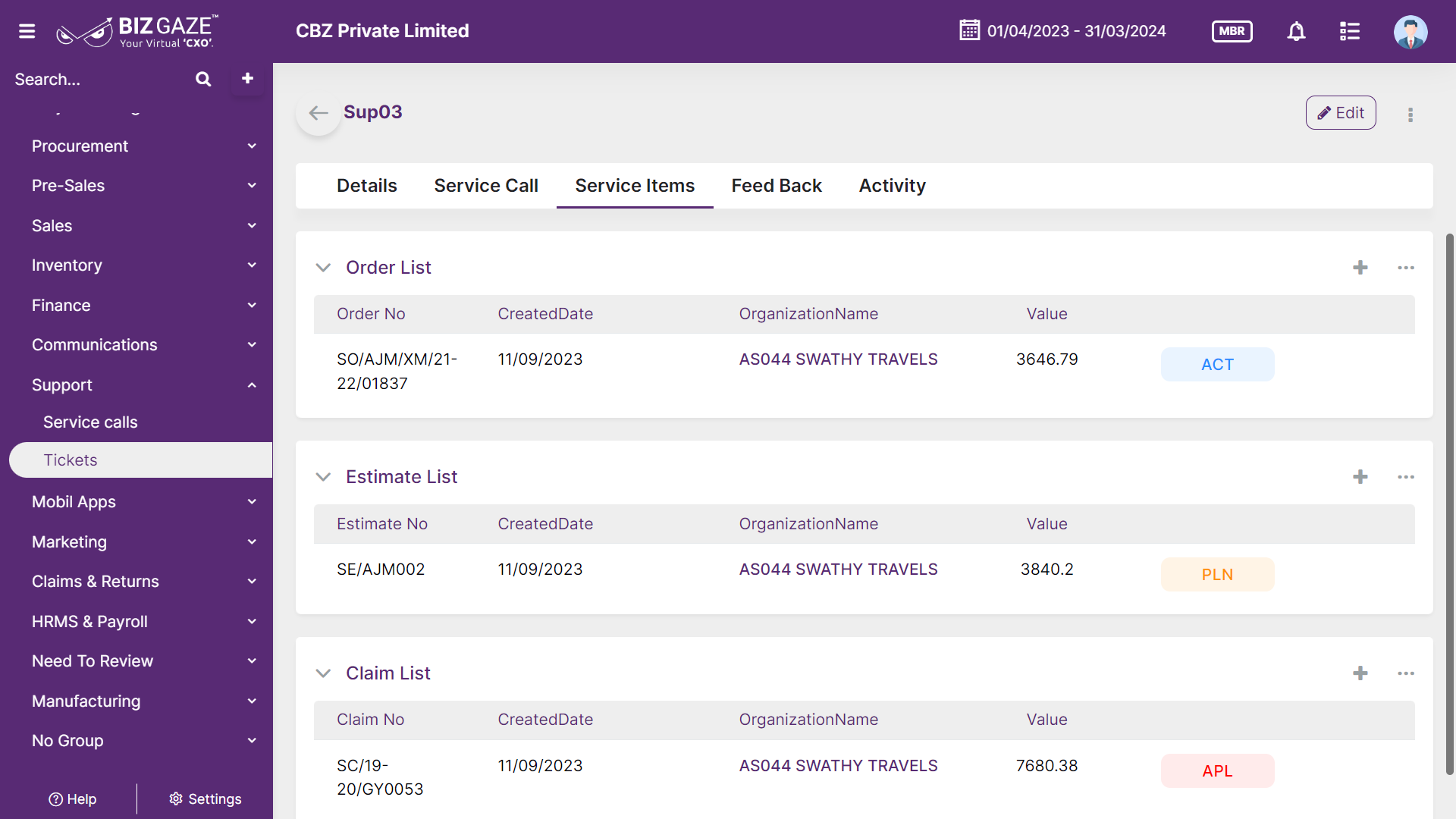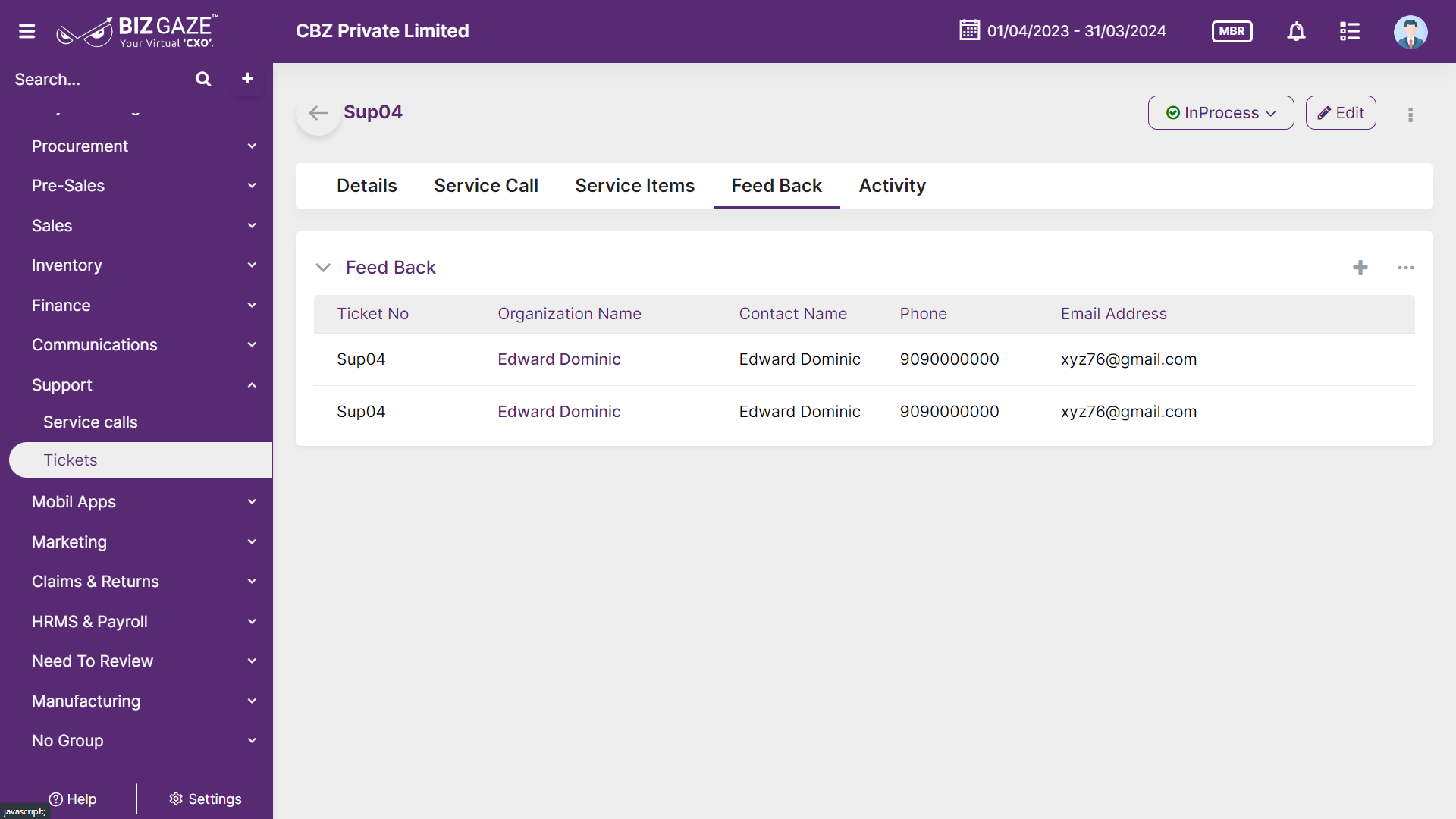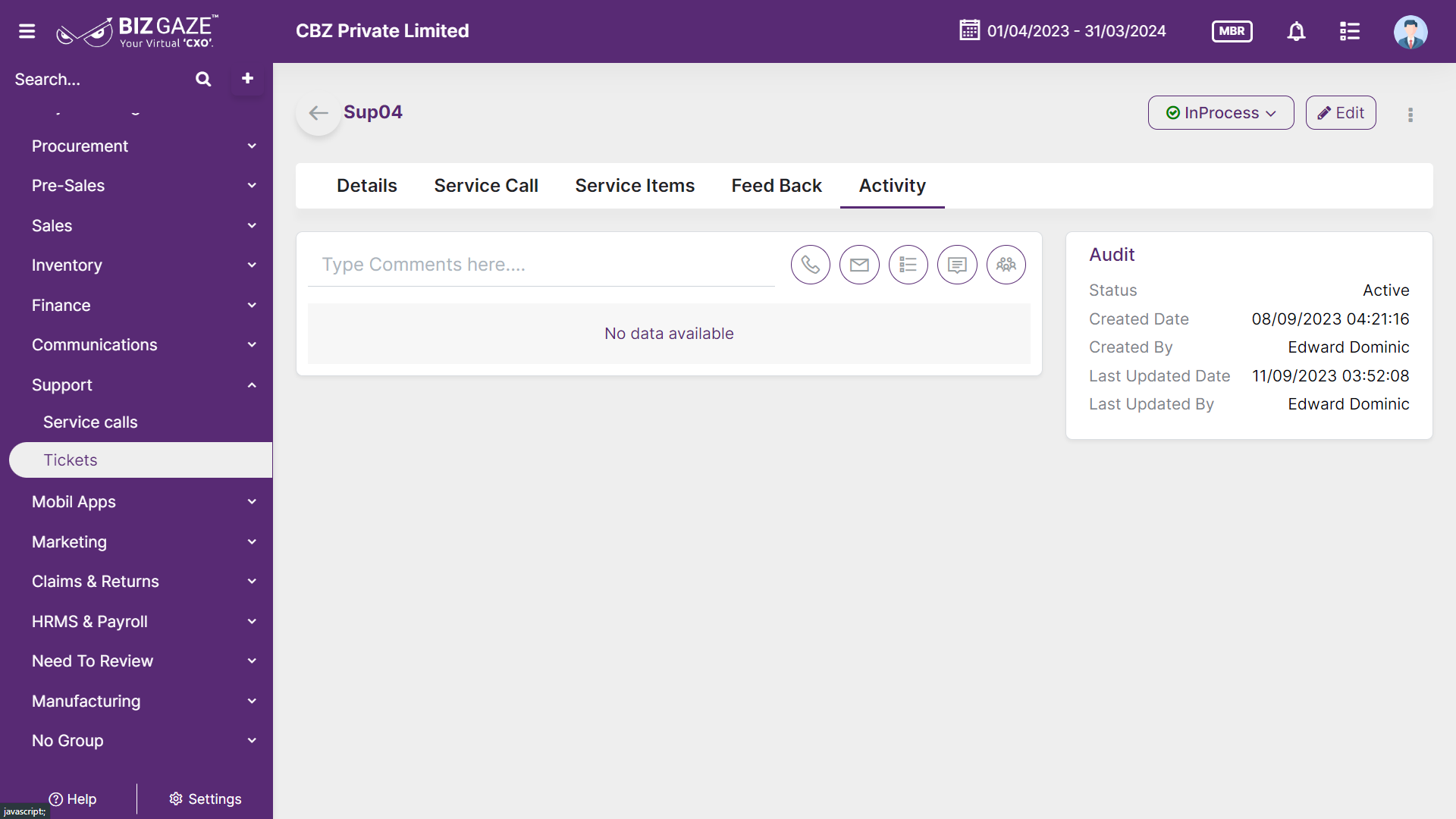Introduction
Ticketing systems play a vital role in helping businesses. Such as effectively dealing with high customer support requests from various communication channels. Many organizations need to pay attention to this customer service tool. This is mainly due to the need to understand a ticketing system and how it can help a business.
BizGaze’s “Tickets app” automates the ticketing process. A ticket is created automatically every time a customer raises a query using a support channel. With Increased agent efficiency and productivity, the agents always resolve requests based on ticket priorities.
Stage Workflow
| Field name | Description |
| Unassigned | Ticket is created but not yet assigned to the support agent |
| Open | The ticket is waiting for acceptance from agent |
| In process | Ticket is allocated to the support executive |
| Waiting | The ticket is accepted by the customer support agent |
| Resolved | Ticket issue is resolved by support agent |
| Closed | Ticket issue is resolved successfully and closed |
Portlets & Widgets
In the layout view, a Portlet accurately represents each functionality, and its corresponding data is precisely viewed as a Widget. The following section includes the default portlets and widgets of the Tickets App.
This section contains Contact Details, Support Ticket Audit Details, Support Issues, and Support Attachment Details of the Ticket.
Support Ticket Audit
Serial number of the Ticket, Allocation details, Ticket created date, Closed date, and Priority of the Ticket are displayed in this widget
| Field name | Description |
| Ticket No | Displays the system generated unique identification number assigned to each support ticket. The ticket number is used to track and reference the ticket, allowing support agents and customers to easily identify and communicate about a specific issue or inquiry. |
| Raised Date | Date on which a ticket is raised by the customer. It refers to the date and time when the support ticket was initially created or raised by the customer |
| Allocated Name | Displays the name of the support agent or team who has been assigned or allocated to handle the particular support ticket. This ensures that the ticket is directed to the appropriate person or group responsible for addressing the customer’s concern. |
| Priority | Priority of the ticket issue is displayed. Priority represents the level of urgency or importance assigned to a support ticket. It indicates how quickly the issue needs to be addressed. |
| Accepted By | Displays agent name of the the support agent or team member who has taken ownership or responsibility for the support ticket |
| Accepted Date | Date on which the ticket is accepted by the support team. The date and time when the support ticket was accepted by the assigned support agent or team. It signifies the point at which the support agent or team formally begins working on the ticket. |
| Closed By | Displays name of the support team or agent who solved and closed the ticket |
| Closed Date | Date on which ticket query is solved and closed |
Contact details
Contact details of the customer are displayed
| Field name | Description |
| Contact Name | Name of the contact person from organization is displayed |
| Phone Number | Phone number of the contact person is displayed |
| Email Address | Email id of the contact person is displayed |
| Support Attachments | Images/documents and type of the attachments of the Ticket are displayed |
Support Issues
This section contains particular group’s support issue details
| Field name | Description |
| Issue Name | Displays name of the issue |
| Issue Group | Issue group name to which the ticket belongs. Issue group names are typically created to classify and prioritize different types of issues, facilitating efficient issue management and resolution |
| Resolution | Brief description about the resolution against the ticket raised is displayed |
| Working Time | Time consumed to resolve the issue or ticket raised is displayed. It refers to the duration within which a reported issue or problem should be resolved by the service provider, starting from the time the issue was reported. |
| Description | Comments or short notes about the ticket is displayed |
Ticket Task
| Field name | Description |
| Task Id | The system generated unique code or short name code of the task is displayed |
| Subject | The subject of the task is displayed. It refers to a concise description or title that represents the main purpose or objective of a particular task or assignment |
| Assigned To | Displays to whom the task is assigned to (user name of the employee / customer) is displayed |
| Project | Displays project name of the task. The unique name or title assigned to a specific project. It serves as an identifier for the project and helps distinguish it from other projects within an organization. |
| Date/Created By | Displays the name of user who created the task and date of creation |
Service Call
Service calls refer to requests made by customers or clients to receive assistance or support for a particular service or product. This widget contains service call details
| Field name | Description |
| Assigned To | Name of an support agent to whom the ticket is assigned. |
| Phone No. | Phone number of the support agent is displayed |
| Date and Time | Date and time when the ticket is created. The date and time when the support ticket was accepted by the assigned support agent or team. It signifies the point at which the support agent or team formally begins working on the ticket. |
| Closing Date | Displays the date when the ticket created is resolved by the support agent |
Order List
The Order List refers to a collection or record of support tickets that are related to customer orders
| Field name | Description |
| Order No. | Displays estimate number of the sales order. It refers to a unique identifier assigned to the sales order. The order number helps to track and manage the order throughout the Sales process |
| Created Date | Displays the date when the order is placed |
| Organization | Name of the organization is displayed |
| Value | Value refers to the Total amount of the Invoice. |
Estimate List
The Estimate List refers to a catalog or log of support tickets that involve providing estimates or quotes to customers
| Field name | Description |
| Estimate No. | Displays estimate number of the sales order. It refers to a unique identifier assigned to the Estimate document. The estimate number helps to track and manage the estimate throughout the Sales process |
| Created Date | Displays date when the sales estimate is created |
| Organization | Name of the organization is displayed |
| Value | Estimated amount of the order is displayed |
Claim List
The Claim List is a compilation or inventory of support tickets that pertain to customer claims or complaints.
| Field name | Description |
| Claim No. | A claim number is a unique identifier assigned to an insurance claim or a legal claim. It is used to track and reference the claim throughout the claims process |
| Created Date | Date on which the claim for an order is raised. It is important for tracking purposes and helps determine the expected delivery timeline |
| Organization | Name of the organization is displayed |
| Value | Displays the Total amount of the Sales Claim |
Feed Back
This section contains the feedback provided by the customer to the support received for Ticket (issue) raised.
| Field name | Description |
| Ticket No | Ticket number or reference number, is a unique identifier assigned to a specific ticket or support request |
| Org Name | The name of the organization or company associated with the ticket. It indicates the entity or business for which the support request was made. |
| Contact Name | The name of the person who initiated the ticket or is associated with the support request. It identifies the individual who made contact with the support team. |
| The email address associated with the ticket or the email contact provided by the customer. It serves as a means of communication for the support team to correspond with the customer | |
| Phone No | The Phone No, short for phone number, represents the contact number associated with the ticket or provided by the customer for support purposes. |
Activity Log provide users with essential information, notifications, and real-time updates to keep them engaged and informed about key activities in apps related to updates, notifications, and stage changes.
| Field name | Field Description |
| Comments | User can write short notes or comments about the Tickets |
| Audit | |
| Created Date | Date when the Tickets is created |
| Created By | Name of the person who created the Ticket |
| Last Updated Date | Last stage changed of the Tickets |
| Last Updated By | Name of the person who last updated the stage |
| Status | Displays the current status of the Tickets |
| Time-Line | This widget tracks all the activities within the app. |
Reports
A report is a document that presents information in an organized format for a specific audience and purpose. Although summaries of reports may be delivered orally, complete reports are almost always in the form of written documents.
- Tickets Master
